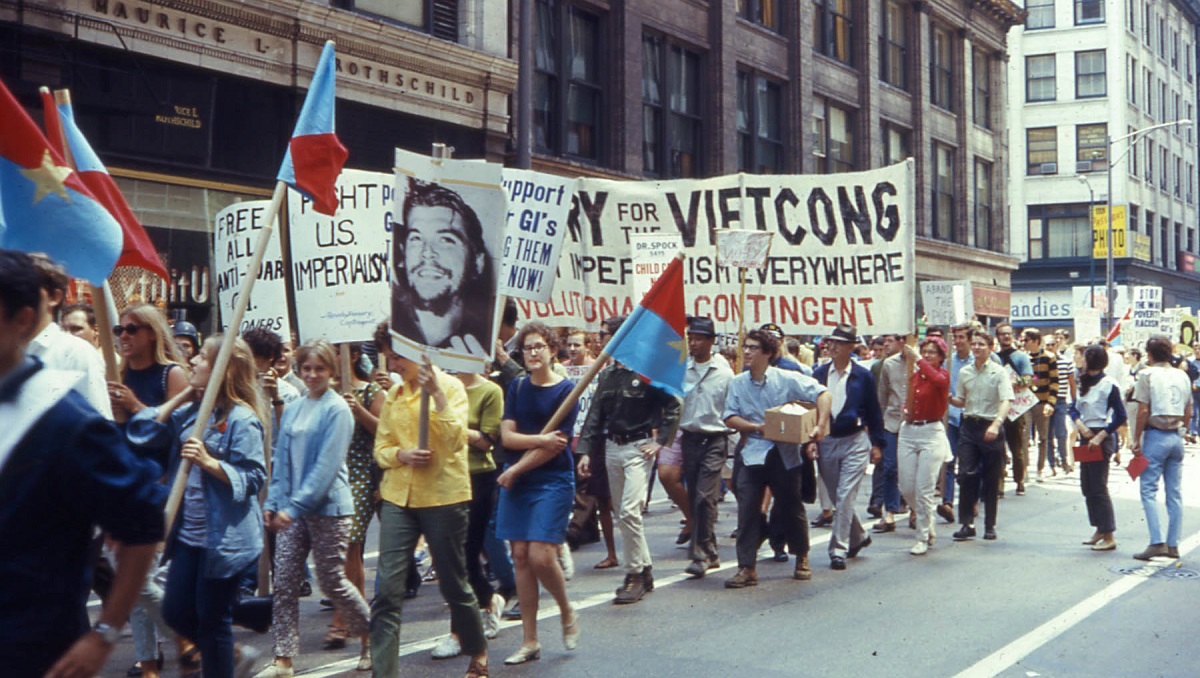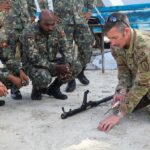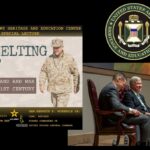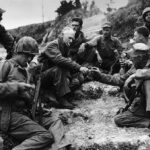
Max Margulies is in the studio with guest host Carrie Lee for the fifth episode in our multi-part special series supporting the U.S. Army War College’s Civil-Military Relations Center. Max and Carrie discuss the relationship between the government and society when it comes to the use of the military. Whether it’s peacekeeping operations versus declared war, the impact of casualties on public opinion, or the resources expended to prosecute international goals, today’s discussion considers how much the views of the voting population play in the calculus of policy making. How does public opinion affect where, how and why U.S. officials prosecute foreign policy through the use of the military?
I still think that public opinion matters both normatively and practically.
Podcast: Download
Subscribe: Apple Podcasts | Spotify | Amazon Music | Android | Pandora | iHeartRadio | Blubrry | Podchaser | Podcast Index | TuneIn | Deezer | Youtube Music | RSS | Subscribe to A Better Peace: The War Room Podcast
Max Margulies is the Director of Research and an Assistant Professor at the Modern War Institute at West Point. He also serves as course director for the Defense and Strategic Studies major’s thesis program. Prior to joining MWI, he was a faculty member in West Point’s Department of Social Sciences, where he taught classes on international affairs and served as Executive Director of the Rupert H. Johnson Grand Strategy Program. He holds a PhD in Political Science from the University of Pennsylvania, an MA in Political Science from Columbia University, and a BA in Political Science (Honors) from McGill University.
Carrie A. Lee is an associate professor at the U.S. Army War College, where she serves as the chair of the Department of National Security and Strategy and director of the USAWC Center on Civil-Military Relations. She received her Ph.D. in political science from Stanford University and a B.S. from MIT.
The views expressed in this presentation are those of the speakers and do not necessarily reflect those of the U.S. Army War College, U.S. Army, or Department of Defense.
Photo Description: Vietnam anti-war march, 10 August, 1968, occurred as Chicago, IL was preparing to host the Democratic National Convention.
Photo Credit: David Wilson via flickr





One area you didn’t really focus on was the influence of diaspora and associated social networks that have values that are not necessarily focused on US national interest but are focused on their identifiable homeland cultural, political and social values. The current activities occurring US wide by Palestinian supporters illustrates the influence of various groups that ultimately help shape societal views and its impact on foreign policy of elected (and non-elected) officials who set US national security decisions. Curious to hear views on the impact of normative changes that have occurred over time as the US has changed from a society that looked for a “melting pot” society where people bring their unique values yet integrate into society and identify with the US national values to a society that is more of a “stew” in which people continue to create diaspora, want to continue their own values and are only interested in more economic opportunity while having a society that looks more like where they came from. With the increased focus on self and country of origin vs. historically established US values there is less support for foreign policy actions outside the US particularly when it involves the values the individual was raised with. Given the churn occurring within Congress and the constant shifting occurring during press engagement.
Re: commenter “wir’s” thoughts above — specifically as relates to the US changing from a “melting pot” society to a “stew” society — consider the following, post-Cold War, “globalization”/”market-based” rationale:
” … No longer does the (U.S. Supreme) Court feel a need to foster a national unity that transcends racial consciousness or to further the assimilation of racial minorities. Such strategic needs have passed, together with the passing of the Cold War’s chief external threat. Thus the ‘Grutter’ Court could view the prospect of multiculturalism with equanimity despite the fact that, as (Philip) Bobbitt correctly perceives, multiculturalism makes it ‘increasingly difficult’ for a Nation State ‘to get consensus on public-order problems and the maintenance of rule-based legal action.’ Rather than regarding the rise of multiculturalism as a liability that had the potential to weaken or even fracture the Nation, the Court saw it as an asset to be exploited for all the advantages that it could bring American business in their international transactions. … ” (Item in parenthesis above are mine. See the bottom of Page 703 and the top of Page 704 of the Catholic University of America, Columbus School of Law paper “Moral Communities or a Market State … ” by Antonio F. Perez and Robert J. Delahunty.)
Thus, post-the Old Cold War, as both government foreign policies (see my comments below) and government domestic policies (see “wir” and I above) became more “globalization” and “market-based” — and, thus, the use and/or potential use of our military accordingly — this significant change (from Old Cold War days ) ultimately changed the relationship between societies and government both here at home and there abroad?
Re: civil-military relations, at the very beginning of this podcast, Dr. Lee notes that this podcast will be about a less-appreciated aspect of civil-military relations; this being, (a) the relationship between the society and the government and, this, (b) as relates to matters such as if, when, where, how, etc., one’s military might be used.
Post-the Old Cold War — as to this such relationship (between the society and the government) — and as to this such issue (if, when, where and how the military should be used) — might the following quoted items prove useful?:
“Since the 1990s the focus of American international security policy has been focused on creating conditions for extending zones of security and prosperity to other states under the theory that ‘political as well as economic globalization would make the world safer — and more profitable — for the United States.’ Consequently, the United States saw expansion, rather than retraction, of American military presence around the world.” (See the 2016 Second Edition [not the 2010 First Edition] of the book “Exporting Security: International Engagement, Security Cooperation, and the Changing Face of the US Military” by U.S. Naval War College Professor Derek S. Reveron; therein, see the bottom of Page 2 of the Introduction chapter — directly under the heading “Militaries Do More Than Fight Wars.”)
“These combine with the enduring ideal of spreading the benefits of market democracy and a corresponding assumption that other democracies will embrace the US global agenda of opening markets, promoting civil liberties, and confronting organizations and states that seek to challenge the existing American international order.” (Again, see the 2016 Second Edition [not the 2010 First Edition] of the book “Exporting Security: International Engagement, Security Cooperation, and the Changing Face of the US Military” by Professor Derek S. Reveron; in this case, see Page 2 of the Introduction chapter and, there, look to the end of the paragraph that begins “As the United States looks ahead … ”)
“a. An IDAD (Internal Defense and Development) program integrates security force and civilian actions into a coherent, comprehensive effort. Security force actions provide a level of internal security that permits and supports growth through balanced development. This development requires change to meet the needs of vulnerable groups of people. This change may, in turn, promote unrest in the society. The strategy, therefore, includes measures to maintain conditions under which orderly development can take place.” (See our own Joint Publication 3-22, “Foreign Internal Defense;” therein, see Chapter II, “Internal Defense and Development” and Paragraph 2, “Construct.”)
Based on the above, might we say that:
a. As to how our society (and those of our allies and partners, etc., also?) view the use of our (and their?) militaries today —
b. This relates significantly to how our (and their) societies now view the reasonableness — and the successes and/or failures — of the post-Cold War missions addressed in my quoted items above?
The current relationship between our society and our government, likewise, being significantly effected by how our society now views the reasonableness — and the success and/or failures — of such post-Cold War missions as I address in my quoted items above?
Another way of looking at matters such as (a) the relationship between our society and our government and, this, (b) as relates to our government’s use of its military to achieve, for example, “transformative” foreign policy goals — as to these such matters, consider the following re: our recent war in Afghanistan:
“First, an insurgency strategy provides a more accurate description of the nature of the problem in Afghanistan, as well as the means needed to address it. Given that the international coalition’s aim is not merely counterterrorism but also broader societal transformation, the main hurdle is not the existence of Taliban fighters, the Haqqani Network, or other groups currently categorized as insurgents; they are simply actors that cause tactical friction in the struggle to transform Afghan society. The challenge is to transform not only the political system that, in part, is an unfortunate post-invasions creation of the West, but also societal ideas at large. Rather than assuming that the West is the protector of the existing Afghan political order, as the counterinsurgency approach does, an insurgency approach would acknowledge that Afghan society is in fact far from permeated by Western notions of governance, justice, and economic management, and that the international coalition is instead the agent of change.” (In Joint Forces Quarterly 70 [3rd Quarter, July 2013], see the article “A Western Insurgency in Afghanistan” by Robert Egnell; therein, see the bottom of column “a” and the top of column “b” on Page 12.)
From the above, one might easily surmise that the relationship between our society and our government today, this has been (positively or negatively?) effected by our government’s decision, post-the Old Cold War, to use our military (in coordination with our other “whole of government” assets) as “agents of change?”
Note that:
If a significant portion of a society derives its current (or recent) degree of power, influence, control, status, privilege, safety, security, etc., from the status quo (or a recent status quo ante) and if:
This significant portion of a society sees its government and/or military as (actually in the foreign policy sense and potentially in the domestic policy sense) being an “agent of change” (see my comment immediately above),
Then it is quite understandable that (a) the relationship between this significant portion of the society — (b) as relates to this “change agent” focus of its government and its military will — (c) significantly change?
Then
Thus it is an extreme understatement to say that U.S./Western social conservatives, much like Afghan/Islamic social conservatives, do not see post-Cold War “globalization”/”market-based” foreign or domestic “change agent” governments — and/or “globalization”/”market-based” foreign or domestic “change agent” militaries — this, in the favorable light that they saw the “prevent (communist) change” governments and militaries of the Old Cold War?
Q: Given the above, how then does public opinion affect where, how and why U.S. officials prosecute foreign (and/or domestic?) policy through the use of the military?
A: By pointing out and/or indicating, in various ways, that the costs associated with pursuing certain foreign (and/or domestic?) policies (for example, globalization/market-based state and societal “transformative” policies both here at home and/or there abroad) — and the use/potential use of the military in the service of same — that these such costs (for example, internal and/or external instability) outweigh/will outweigh the benefits that have been — and/or will be — derived from these such activities and approaches?
I’m disappointed in this episode. The “expert” had no expertise in any of the questions the interviewer asked and his responses were consequentially vague opinion and useless from almost any perspective and certainly not probative of the topic. There is so much that can be said about this topic that I’m really surprised that somehow you managed to find both an interviewer and an expert who could not really speak to the topic intelligently. I was also dumbfounded at the interviewer’s willingness to leap to conclusions that were not supported by the weak and vague responses from the expert. I was going to listen to it again to make sure I wasn’t just confused but I decided that I will never get the first 35 minutes back and I didn’t feel like wasting another 35 minutes in the hopes that some portion of my disappointment was remedied.